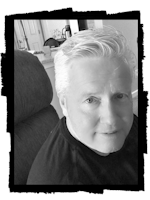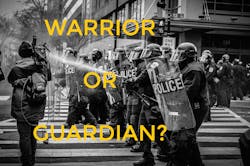There’s been some discussion lately regarding how police officers should act or portray themselves. The topic being debated is whether we should train our officers to be warriors or guardians? An article in The Washington Post indicated that the Washington State Criminal Justice Training Commission has modified its training to produce “’guardians’ of democracy who serve and protect, instead of ‘warriors’ who conquer and control.”
“If your overarching identity is ‘I’m a warrior,’ then you will approach every situation like you must conquer and win,” said Sue Rahr, the commission’s executive director. “You may have a conflict where it is necessary for an officer to puff up and quickly take control. But in most situations, it’s better if officers know how to de-escalate, calm things down, slow down the action.”
Similarly, in Minnesota a chief deputy from the Ramsey County Sheriff’s Office cancelled the approval to send ten of its deputies to training known as, BULLETPROOF, a course which the chief contends “… isn’t something we want to be a part of.” The Bulletproof Mind is taught by Lt. Colonel Dave Grossman, one of the top police trainers in the nation and author of the Pulitzer Prize nominated book, On Killing.
Sue Rahr also published a report in the Harvard Kennedy School titled, “From Warriors to Guardians: Recommitting American Police Culture to Democratic Ideals.” The report, which she co-wrote, warns that too many academies are training police officers to go to “war with people we are sworn to protect and serve.” Newsflash Ms. Rahr—it’s not the police who decide to go to war, it’s the person who fails to comply or attacks us. We don’t determine the use of force—they do.
Seth Stoughton, a former Tallahassee cop and law professor at the University of South Carolina said, “Officers who treat people humanely, who show them respect, who explain their actions, can improve the perceptions of officers, or their department, even when they are arresting someone. The goal of the guardian officer is to avoid causing unnecessary indignity.”
This guardian moniker promotion has not engendered whole scale support. Critics accuse Rahr of promoting a “hug-a-thug” mentality, one that may get cops killed. Proof in point, almost 20 per cent of her staff quit or was fired after they opposed her suggested reforms. Today, Rahr estimates that two-thirds of Washington’s 285 police chiefs consider her training dangerous, or at the very least they’re skeptical about it.
One of those skeptics is Alexis Artwohl, a former police psychologist and consultant to the International Law Enforcement Educators and Trainers Association, better known as ILEETA. Artwohl co-wrote a book on deadly force and one of the blurbs describing the book begins with these words: “In a cop’s world it’s kill or be killed.” She compares police work to defensive driving—“expecting something bad is going to happen. It’s not about dealing with normal traffic flow.” She continued, “We should go out there and expect something bad will happen and watch for it. If we are not paying attention, we could die.”
Considering that as we began to celebrate National Police Week a total of 45 police officers had already died on duty, my gut tells me I need to embrace a Warrior Mentality rather than that of a guardian. Ambushes and outright defiant offenders murder and brutalize cops every day. And it isn’t because cops are overbearing. In fact, a recent study on police use of force indicated that force was used in just 1 of 1,167 cases. Less than 1 in 1,100 calls for service, and less than 1 in 120 criminal arrests resulted in police use of force.
It seems the folks committing the crimes and those calling for service are in need training, not police officers. The very nature of our job places us in a reactive situation. We’re most likely always behind the power curve, waiting for someone to act before we’re able to take action. In many situations, acting like a guardian will likely place us even further behind that power curve. Besides, the recent tidal wave of body cam videos has shown that most officers exercise extreme patience with thugs, sometimes to their own disadvantage. A Warrior Mindset enables us to gain control of a situation quickly. Once things are under control, we’re able to dial it back and act more like a guardian. Most cops took the job because they wanted to help people, not harm them. Those who embrace a guardian mentality over that of a warrior perhaps place themselves and their colleagues in dangerous situations.
Studies have proven more cops are injured by thugs, than the other way around. Cops exercise tremendous restraint in most cases, even those with a Warrior Mentality. If the term warrior is offensive to some in the LE community, perhaps it’s time to change careers. Most cops have an innate sense of fairness and kindness. Their main objective is to go home after each shift, not go to war.
Stay Safe, Brothers and Sisters!

John Wills
John M. Wills is a former Chicago police officer and retired FBI agent. He is a freelance writer and award-winning author in a variety of genres, including novels, short stories and poetry. John also writes book reviews for the New York Journal of Books, and is a member of the National Book Critics Circle. His new book, The Year Without Christmas, is available now. Visit John at: www.johnmwills.com.



